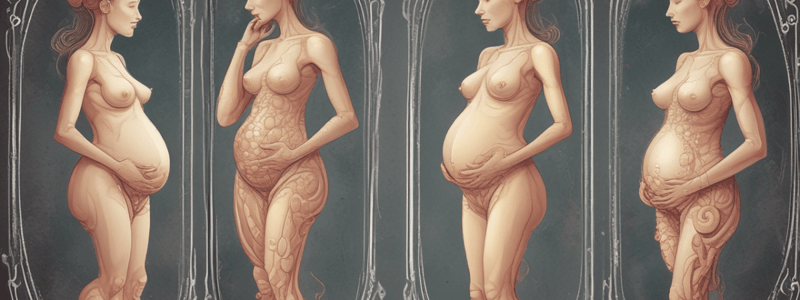Podcast
Questions and Answers
What hormone does the placenta primarily produce during pregnancy?
What hormone does the placenta primarily produce during pregnancy?
- Estrogen (correct)
- Testosterone
- Progesterone
- Thyrotropin
How does high estrogen levels affect FSH and LH release during pregnancy?
How does high estrogen levels affect FSH and LH release during pregnancy?
- They increase their production
- They stimulate their release
- They have no effect
- They suppress their release (correct)
What physiological change occurs in a mother's blood volume during pregnancy?
What physiological change occurs in a mother's blood volume during pregnancy?
- Increases by five liters
- Remains unchanged
- Increases by one to two liters (correct)
- Decreases by half a liter
Which organ system is primarily stimulated by estrogen to grow during fetal development?
Which organ system is primarily stimulated by estrogen to grow during fetal development?
What causes the increase in the mother’s metabolic rate during pregnancy?
What causes the increase in the mother’s metabolic rate during pregnancy?
What happens to the mother’s diaphragm as the uterus grows during pregnancy?
What happens to the mother’s diaphragm as the uterus grows during pregnancy?
What condition can result from the increased blood volume in a pregnant woman?
What condition can result from the increased blood volume in a pregnant woman?
What happens to skin during pregnancy as a result of stretching?
What happens to skin during pregnancy as a result of stretching?
What common digestive issue may occur for mothers due to pressure from the growing uterus?
What common digestive issue may occur for mothers due to pressure from the growing uterus?
What is the likely outcome of the high energy needs during pregnancy?
What is the likely outcome of the high energy needs during pregnancy?
What major factor contributes the most to weight gain during pregnancy?
What major factor contributes the most to weight gain during pregnancy?
Which of the following contributes least to weight gain during pregnancy?
Which of the following contributes least to weight gain during pregnancy?
How much total weight gain is typically expected during pregnancy?
How much total weight gain is typically expected during pregnancy?
What is the average duration of a pregnancy?
What is the average duration of a pregnancy?
What physiological change affects the urinary bladder during pregnancy?
What physiological change affects the urinary bladder during pregnancy?
How many trimesters are there in a typical pregnancy?
How many trimesters are there in a typical pregnancy?
Which component contributes approximately six pounds to a pregnant woman's weight gain?
Which component contributes approximately six pounds to a pregnant woman's weight gain?
Which hormones are primarily responsible for maternal changes during pregnancy?
Which hormones are primarily responsible for maternal changes during pregnancy?
Which of the following statements about weight gain during pregnancy is false?
Which of the following statements about weight gain during pregnancy is false?
What role does the placenta play during the second trimester?
What role does the placenta play during the second trimester?
What physiological change occurs in the mother's body during pregnancy?
What physiological change occurs in the mother's body during pregnancy?
At what point in pregnancy does the corpus luteum stop being the primary hormone producer?
At what point in pregnancy does the corpus luteum stop being the primary hormone producer?
In which trimester does significant fetal growth begin to occur?
In which trimester does significant fetal growth begin to occur?
Which hormone is produced by the embryo and plays a significant role in pregnancy?
Which hormone is produced by the embryo and plays a significant role in pregnancy?
Flashcards are hidden until you start studying
Study Notes
Overview of Pregnancy
- Pregnancy, also known as gestation, involves the development of offspring within a woman's uterus.
- The average duration is approximately 38.5 weeks, divided into three trimesters, each lasting about 13 weeks.
Hormonal Changes
- Hormones play a crucial role in maternal changes, primarily estrogen and progesterone.
- Human chorionic gonadotropin (hCG) from the embryo supports early pregnancy hormones.
- Initially, the corpus luteum and ovary produce estrogen and progesterone until about week 12, supporting embryo development and placental formation.
- The placenta becomes the primary endocrine organ, taking over hormone production in the second trimester.
Functions of Estrogen
- Estrogen rises throughout pregnancy, suppressing FSH and LH release to prevent ovulation.
- It promotes fetal organ development, particularly in lungs and liver.
- Maternal tissue expansion occurs, enlarging the uterus and mammary glands in readiness for lactation.
Physiological Changes
- The anterior pituitary enlarges, increasing thyrotropin production, which raises the mother's metabolic rate and appetite to support gestation energy needs.
- Blood volume increases by 1 to 2 liters for adequate fetal nourishment, leading to elevated blood pressure and pulse.
- The expanding uterus can compress pelvic blood vessels, risking varicose veins development.
Skin and Dermal Changes
- Stretching of the abdominal dermis can cause striae (stretch marks), usually seen on the abdomen, breasts, thighs, and hips, which fade post-childbirth.
Respiratory and Digestive Adjustments
- The lungs must work 50% harder to supply oxygen for the increased blood volume, potentially causing shortness of breath in later trimesters.
- The growing uterus can press against the stomach, causing heartburn or gastric reflux; symptoms typically ease as the fetus descends in late pregnancy.
Urinary Changes
- Increased bladder pressure from the descending uterus can lead to frequent urination.
Weight Gain in Pregnancy
- Total weight gain typically ranges from 25 to 35 pounds, consisting of the following:
- 7-8 pounds from the growing fetus.
- 6 pounds from the placenta and amniotic fluid.
- 3-4 pounds from increased breast tissue.
- 4 pounds from the growing uterus.
- 4 pounds from increased blood volume.
- Fat gain varies but generally adds 3 to 10 pounds.
Studying That Suits You
Use AI to generate personalized quizzes and flashcards to suit your learning preferences.




